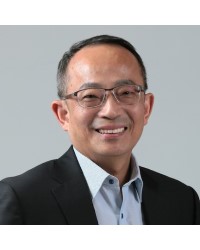Moderator
Dr. Zorian holds 35 US patents, has authored four books, published over 350 refereed papers and received numerous best paper awards. A Fellow of the IEEE since 1999, Dr. Zorian was the 2005 recipient of the prestigious Industrial Pioneer Award for his contribution to BIST, and the 2006 recipient of the IEEE Hans Karlsson Award for diplomacy. He received the IEEE Distinguished Services Award for leading the TTTC, the IEEE Meritorious Award for outstanding contributions to EDA, and in 2014, the Republic of Armenia’s National Medal of Science.
Joseph Bousaba is the General Manager and Vice President of the Emerging Sensors Business Unit at TDK driving revenue and market share growth while leading the development and productization of emerging and disruptive MEMS-based sensor technologies including ultrasonic 3D and GAS sensor solutions. In his current role at TDK Invensense, Joseph also serves as the President of Chirp Microsystems, a wholly owned subsidiary of TDK that was acquired by TDK MEMS Sensor Business Group in 2018. Prior to joining TDK, Joseph was the Vice President of Consumer IoT and Smart Home at Qualcomm where he built and managed a multi-hundred million dollar business from 2014 to 2019.
Joseph received a M.S. and B.S. degrees in Electrical Engineering from the University of North Carolina at Charlotte.
Victor Zhirnov is Chief Scientist at the Semiconductor Research Corporation. He is responsible
for envisioning new long-term research directions in semiconductor information and communication technologies for industry and academia .His semiconductor experience spans over 30 years in the areas of materials, processes, devices physics and fundamental limits.
Victor received the M.S. in applied physics from the Ural Polytechnic Institute, Ekaterinburg, Russia, and the Ph.D. in solid state electronics and microelectronics from the Institute of Physics and Technology, Moscow, in 1989 and 1992, respectively. He has authored and co-authored over 150 technical papers and contributions to books.
As head technologist at Mubadala Capital – Ventures, Rafic oversees the technology strategy and roadmap for building the organization’s ventures investment portfolio. He is a long-time veteran of the semiconductor technology industry, serving in his most recent position as Executive Fellow of Globalfoundries.
Rafic pioneered the iDDT pulse method for testing semiconductor integrated circuits and has worked on research funded by DARPA, NSF, Intel, IBM, and Carolinas Medical Center, among others. He won several research awards including the First Citizen Research Scholar Medal, the IBM Faculty Research Award and the ALCOA Outstanding Graduate Faculty Award. In government, Rafic served as Head of Strategic Planning of the Abu Dhabi Education Council and senior advisor to the Director General.
Rafic is a member of the Board of Directors of the Semiconductor Research Corporation and serves on the National Decadal Planning Committee for Semiconductors. He is an avid advocate of individuals with special needs and has served as a member of the Community and Legacy Committee of the Special Olympics 2019 World Summer Games.
Prof Tim Cheng is the Dean of Engineering at Hong Kong University of Science and Technology, and Chair Professor jointly in the Departments of ECE and CSE. Before joining HKUST, he was a Distinguished Professor of Electrical and Computer Engineering (ECE) at the University of California, Santa Barbara, where he served since 1993. In the past three decades, Prof Cheng’s research has covered a wide range of topics including computer vision and medical image analysis, as well as integrated circuit design automation, verification and testing. Prof Cheng has extensive experience in fostering cross-disciplinary research collaboration. He has published more than 500 technical papers, co-authored five books, held 12 US patents, supervised 60 PhD dissertations, co-founded 3 companies and transferred several of his inventions into successful commercial products.







